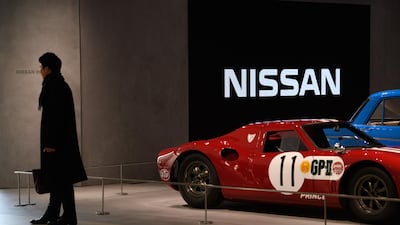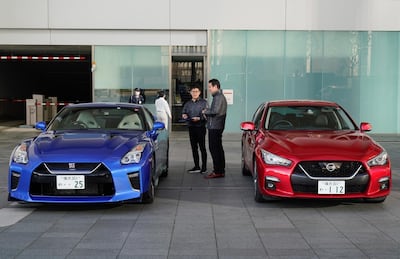Nissan shares fell to a decade low after the Japanese carmaker cut its full-year profit outlook for a second time and scrapped its year-end dividend payout to investors, including top shareholder and partner Renault.
Shares of Nissan finished down 9.6 per cent at 513.7 yen in Tokyo trade on Friday, their lowest since 2009 and their biggest one-day fall since 2013. The stock is down 19 per cent since the start of the year, after declining 28 per cent in 2019 and 22 per cent in 2018.
The dividend cut will be particularly painful for Renault, which owns 43 per cent of Nissan. The French carmaker, in turn, on Friday said it would cut its dividend for 2019.
Dogged by falling sales in the US, Japan and Europe, as well as instability in its most senior management ranks following the arrest of former chairman Carlos Ghosn, Nissan reduced its full-year operating profit forecast to 85 billion yen (Dh2.8bn), down from an earlier estimate of 150bn yen.
By slashing its dividend payment to the lowest level since 2011 and pursuing a previously announced plan to cut 12,500 jobs globally, Nissan is trying to free up cash for investment in next-generation technology needed to stay competitive in areas such as electric vehicles and self-driving cars.

“Unfortunately, our business performance has worsened more than we anticipated, and there’s no letting up on investing in the future,” chief executive Makoto Uchida said at a press conference at the company’s Yokohama headquarters. “In order to invest in growth, we ended up with this dividend.”
The results and outlook underscore the challenges facing Mr Uchida, who took over as chief executive in December and promised to unveil a revised midterm plan in May for Nissan and its two-decade alliance with France’s Renault, which has itself recently appointed a new chief executive.
Nissan had initially projected an operating profit of 230bn yen for the fiscal year through March, but trimmed that last quarter. A year ago, it earned 318bn yen — which at the time marked its lowest annual income in a decade.
Nissan’s total dividend for the current fiscal year is on track to be 10 yen a share, including the prior payout. In November, the Japanese company withdrew its dividend outlook after cutting it in May — the first reduction since it suspended dividends in 2009 amid an industry-wide recession.
Executives sought to downplay concern about its negative free cash flow, which ballooned to minus 256bn last quarter compared with minus 70bn a year ago.
“If we need to borrow more money we can do so, and at the right time we will also issue financial bonds,” said Rakesh Kochhar, a senior vice president in charge of global treasury and automotive sales finance operations.
For its latest three-month period, Nissan posted an operating profit of 23bn yen, short of analysts’ average estimate for 59bn yen. Quarterly sales fell 18 per cent to 2.5 trillion yen, missing analysts’ prediction for 2.7tn yen.
Revenue and income fell in all of Nissan’s core sales regions, including in China and its home market of Japan. In North America, its largest and most lucrative market, profits fell by more than 25 per cent compared to a year ago to 21.6bn.
Worldwide sales volumes at Nissan slid 8.4 per cent to 5.18 million vehicles last year, pulling down its combined performance with Renault to third place globally after Volkswagen and — for the first time since 2016 — Japanese rival Toyota.
Mr Uchida said Nissan plans to reopen three of its Chinese factories closed by the coronavirus outbreak from February 17 and two others from February 20. Those plants have been closed since late January as a planned break for the Lunar New Year was extended amid concerns about the spread of the contagion.
“Considering that we won’t resume production until mid-February, that will have some impact” on income and revenue in the current quarter, Mr Uchida said.
Meanwhile, Nissan stepped up its claims against Mr Ghosn this week, suing him for 10bn yen in damages.


